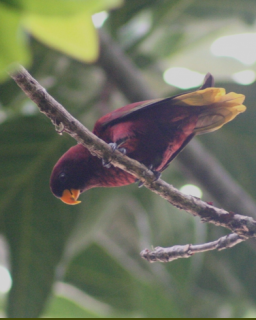Pohnpei Lorikeet |
|
|
Also known as: Ponape Lory, Cherry-red Lorikeet, Caroline Lorikeet
Photos
View in GalleryDid You Know?
The Pohnpei Lorikeet is the only all-maroon coloured parrot.Academic Research
Related publications: Trichoglossus rubiginosusSpecies Profile
Genus: Trichoglossus | Species: rubiginosus
Size:
24cm (9.3 in)
Weight:
70-85g (2.6-3.0 oz)
Subspecies including nominate:
one
Colour Adult:
Both adults in general deep maroon in colour, with slightly darker barring; olive/yellow wings and tail. Bill orange in male, more yellow in female. Eye yellow/orange in male, grey/white in female.
Colour Juvenile:
As in adults but bill brown. Eye brown.
Call:
Calls are described as loud, high-pitched and chattering. Hissing screeches also recorded. Soft crooning notes emitted at dusk.
Listen NowMore Information:
Content Sources:
CITES
BirdLife International
Cornell Lab of Ornithology/Birds of the World
A Guide to Parrots of the World, Juniper and Parr, 1998
ML Media Collection Catalogue 5690, Pohnpei Lorikeet Trichoglossus rubiginosis, Pratt, H. Douglas, Pohnpei, Micronesia, Jul. 17 1976, Cornell Lab of Ornithology. Site
Parrots of the World, Forshaw, 2006. 2010 edition
Lexicon of Parrots, Thomas Arndt.
Photos
View in GalleryDid You Know?
The Pohnpei Lorikeet is the only all-maroon coloured parrot.Academic Research
Related publications: Trichoglossus rubiginosusSpecies Care
Captive Status:
Not usually kept outside Pohnpei.
Longevity:
Not recorded.
Housing:
Large enclosure 3 x 1 x 2m (9.8 x 3.3 x 6.5 ft), minimum temperature 20C (68 F).
Diet:
Homemade lory porridge of fruits, pollen, rice-flakes, multigrain flakes, honey; dextrose and low-fat yoghurt; rusk or biscuit softened in porridge, mixing vitamins and minerals in; fruits such as: apple, bananas, oranges, pears, cactus fruits, papaya, mango; small quantities of sprouted seeds such as: oats, millet, millet spray, wheat and sunflower.
Enrichment:
Not recorded.
Nest Box Size:
Vertical box 20cm x 20cm x 35cm (8 x 8 x 14 in).
Clutch Size:
1
Incubation Time:
Not recorded.
Fledging Age:
Not recorded.
Hatch Weight:
Not recorded.
Peak Weight:
Not recorded.
Weaning Weight:
Not recorded.
Photos
View in GalleryDid You Know?
The Pohnpei Lorikeet is the only all-maroon coloured parrot.Academic Research
Related publications: Trichoglossus rubiginosusSpecies Wild Status
World Population:
About 10,000, decreasing.
IUCN Red List Status:
Near Threatened
CITES Listing:
Appendix II
Threat Summary:
Not globally threatened. A BirdLife “restricted-range” species. Common, especially in lowland plantations, however, is suspected to be in decline due to land-use changes and other human disturbances.
Range:
Pohnpei, in Caroline Islands, Micronesia.
Habitat:
Found up to 600m (1968 ft) in a variety of habitats including plantations, dense forest, secondary forest, woodland and mangrove.
Wild Diet:
Feeds on nectar and pollen of coconut palms; also fruit and fly larvae.
Ecology and Behaviour:
Conspicuous and noisy, roving in small groups of 2-12 birds and feeding on flowering trees. Birds are sometimes seen flying high overhead; they also may travel some distance over water. Feeds in middle storey of canopy, swinging upside down to feed on coconut and banana flowers.
Clutch and Egg Size:
1 egg
Breeding Season:
December-May. Nest is in cavity in coconut palm or similar large tree.
Related Links:
Photos
View in GalleryDid You Know?
The Pohnpei Lorikeet is the only all-maroon coloured parrot.Academic Research
Related publications: Trichoglossus rubiginosusMembers Only Resources
Please log-in now to find more research, resources and tools.
Not a Member?
Find more great information:
Gain exclusive access to 600+ pages of additional research, seminars and podcasts, specialists to ask your toughest questions, and dozens of other fun resources - when you become a WPT member.
Join Today >>

































